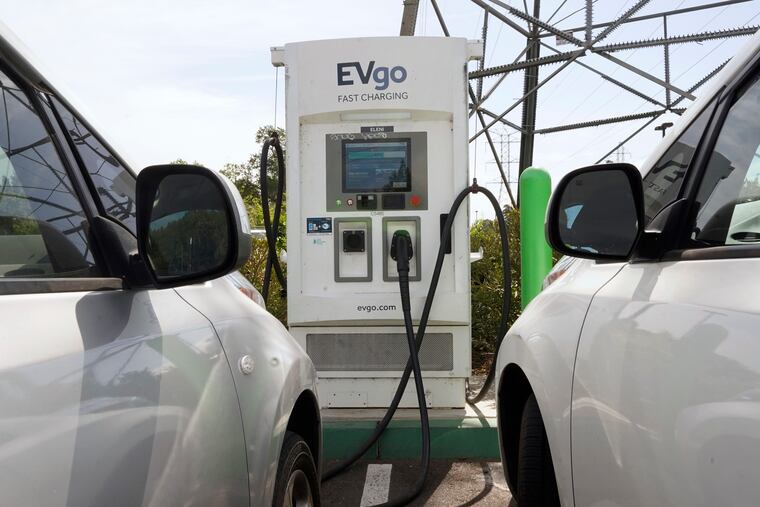Electric cars: More consumers now want to buy them, survey says
Of more than 8,000 respondents, 14% said they would definitely buy or lease an EV and 22% said they would "seriously consider" one.

A growing number of Americans are coming around to the idea of driving electric vehicles, with 71% expressing at least some degree of interest in buying or leasing EVs, according to a national survey released Thursday by Consumer Reports.
Of more than 8,000 respondents, 14% said they would definitely buy or lease an EV and 22% said they would "seriously consider" one. Another 35% said they "might consider getting an electric-only vehicle in the future."
That's up from 4% who in 2020 said they would definitely buy or lease an EV.
"Millions of drivers want to go electric, that was clear from the survey," said Quinta Warren, associate director of sustainability policy for Consumer Reports. "So the demand is growing."
The poll was taken between Jan. 27 to Feb. 18, at a time when gasoline prices were on the rise but before they spiked to an average of $5 per gallon nationwide last month and $6.44 in California. That leads Warren to think consumer interest in EVs would be even higher if the survey were conducted today.
"People understand that it costs them less money to charge an electric vehicle than it does to fuel a gas car," she said, "so absolutely, it makes perfect sense to assume that the demand (to transition to EVs) would go up."
While the national numbers are on the rise, 28% of those surveyed said they would not consider switching to an EV and some of the hurdles cited are familiar ones:
61% had concerns about where and when they could find places to charge their vehicles
55% had “range anxiety” — that is, they feared the EV would conk out before they had a chance to recharge the car’s battery, and
52% worried about the sticker price and the costs of maintaining an EV.
"People do understandably have some concerns and questions about the transition to electric vehicles and low-carbon fuel vehicles as well," Warren said. "These things are new concepts but the more familiar people are with electric vehicles, the more likely they are to want them."
While California has taken the lead in EV adoption, the national survey showed many Americans have had very little experience with electric vehicles.
More than 80% of U.S. respondents said they had not been a passenger in an electric-only vehicle in the past year, 65% do not have a friend, relative or co-worker who owns an EV and 41% said they had not seen an EV in their neighborhood in the past year.
The survey also found that 46% of those surveyed were not aware of federal and state incentives to purchase an EV. Some 53% said tax rebates or discounts at the time of purchase would encourage them to make the switch.
"We think this is an opportunity for policymakers and automakers to create an awareness campaign, make the public more aware that these incentives exist," Warren said.
Federal tax incentives of up to $7,500 are available, although they phase out after automakers sell more than 200,000 plug-ins. GM and Tesla have already reached the threshold and Toyota on Wednesday announced that it had hit the 200,000 mark and its wind-down will begin Oct. 1.
The auto industry has had trouble keeping up with demand for new vehicles because of clogged supply chains. Microchip shortages have resulted in fewer traditional cars and trucks on dealers' lots and that has resulted in vehicles selling for more than their Manufacturer's Suggested Retail Price.
EV sale have been impacted, too.
Research from consulting firm AlixPartners estimates the average cost of raw materials needed to make EV batteries — such as lithium, cobalt and nickel — has leaped more than 140% since March 2020, leading automakers to raise prices for their EV models.
Ivan Drury, senior manager of insights at the auto market research firm Edmunds.com, said he was not surprised that Consumer Report's survey showed increasing interest in electric vehicles.
"People's attitudes toward EVs are definitely changing," Drury said. "You see the Ford F-150 Lightning and the Mustang Mach-E, they are sold out. The F-150 Lightning is sold out until 2024 ... I think there's so much enthusiasm, especially for people who have put a reservation down, that it's not going to curb their enthusiasm. They're still going to purchase the vehicle."